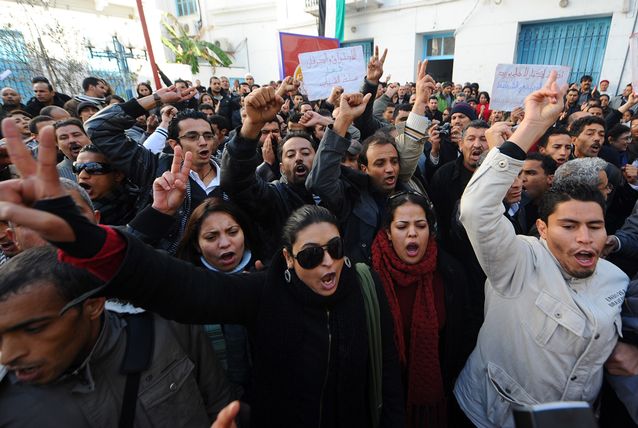All Change in the Middle East

Although the Middle East is routinely described as an “unstable region”, actually this is not always the case.
These Middle Eastern regimes may not look pretty to the Western eye, and they can be rightly accused of numerous crimes and evils, but instability is not their characteristic.
Working around the neighborhood…
All this is against a background where regular Western democracies change their ruling governments every handful of years.
In the past weeks, this history of dictator regime stability in the Middle East has been severely rattled.
The tidal wave of protests demanding change, which successfully toppled Tunisian tyrant Zine El Abidine Ben Ali, after 24 years in office, on January 14, 2011, has now hit Egypt and Jordan
The Egyptian first family is reported to have escaped out of Cairo
Meanwhile democracy itself has served the interests of the fundamentalist terrorist outfit Hizbollah – when they withdrew their members of the Lebanese parliament from the coalition, so bringing down Western leaning Saad Hariri on 25th January, and replaced by stooge Najib Mikati.
Hamas had a similar experience in The Palestinian Authority in the 2006 elections – which they won by a disturbingly large majority.
(At which point the PLO abandoned any pretenses of democratic process, and the Palestinian Authority reverted to joining the prestigious Club MED - Middle East Despots).
Hamas and Hizbollah have discovered they can win both with the gun and with the ballot box, simultaneously.
Regime change, moving from dictatorship to democracy sounds like music to Western ears.
However, looking around my region, a stable dictator as a neighbor looks a more comfortable option than an infant democracy.


Nice analysis - thanks!
ReplyDeleteQuestion: What about Sadaam Hussein? Has his ouster/execution been stabilizing or destabilizing? Or is it different given that it came as a result of U.S. action?
Don't count your chickens yet.
ReplyDeleteEgypt is not Tunisia. Remember the early days of the "green revolution" in Iran as well. All it takes is a strong Republican Guard to take charge and a weak United States to look the other way and, a few thousand deaths later, nothing will have changed.
David Meir - "What about Sadaam Hussein?"
ReplyDeleteYes - another case in point.
A stable dictator was deposed, to be replaced by an unstable infant democracy.
By all accounts (see Wikipedia: Iraq War) over one hundred thousand civilians have died in Iraq, and continue to die on an almost daily basis (terrorist attacks are so common, it's disappeared from the newspapers).
Deposing long-standing dictators is such a costly excercise, from every pov, that I question (at least from Israel's pov)whether the price is worth the supposed benefits.
Good point - perhaps it's been more stabilizing (in the short run) for Israel, but it sure hasn't been for Iraqi citizens. Though I'm curious to what extent Iraqis would prefer life under Sadaam.
ReplyDeleteAlso brings to mind the fall of the Soviet Union and all the infant democracies it created. How do we measure success - and whether it's worth the gamble?